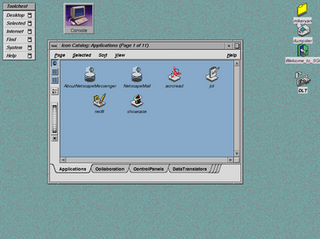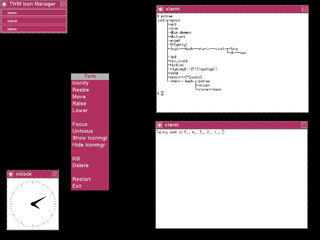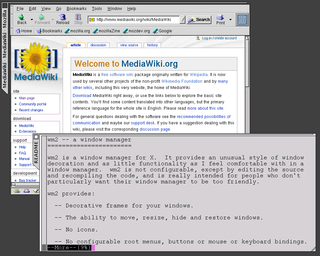
The Common Desktop Environment (CDE) is a desktop environment for Unix and OpenVMS, based on the Motif widget toolkit. It was part of the UNIX 98 Workstation Product Standard, and was for a long time the Unix desktop associated with commercial Unix workstations. It helped to influence early implementations of successor projects such as KDE and GNOME, which largely replaced CDE following the turn of the century.

IRIX is a discontinued operating system developed by Silicon Graphics (SGI) to run on the company's proprietary MIPS workstations and servers. It is based on UNIX System V with BSD extensions. In IRIX, SGI originated the XFS file system and the industry-standard OpenGL graphics API.

The X Window System is a windowing system for bitmap displays, common on Unix-like operating systems.

XFree86 is an implementation of the X Window System. It was originally written for Unix-like operating systems on IBM PC compatibles and was available for many other operating systems and platforms. It is free and open source software under the XFree86 License version 1.1. It was developed by the XFree86 Project, Inc. The lead developer was David Dawes. The last released version was 4.8.0, released December 2008. The last XFree86 CVS commit was made on May 18, 2009; the project was confirmed dormant in December 2011.

HP-UX is a proprietary implementation of the Unix operating system developed by Hewlett Packard Enterprise; current versions support HPE Integrity Servers, based on Intel's Itanium architecture. It is based on Unix System V and first released in 1984.

GNOME Display Manager (GDM) is a display manager for the windowing systems X11 and Wayland.

KDE Display Manager (KDM) was a display manager developed by KDE for the windowing systems X11.
freedesktop.org (fd.o), formerly X Desktop Group (XDG), is a project to work on interoperability and shared base technology for free-software desktop environments for the X Window System (X11) and Wayland on Linux and other Unix-like operating systems. Although freedesktop.org produces specifications for interoperability, it is not a formal standards body.

twm is a window manager for the X Window System. Started in 1987 by Tom LaStrange, it has been the standard window manager for the X Window System since version X11R4. The name originally stood for Tom's Window Manager, but the software was renamed Tab Window Manager by the X Consortium when they adopted it in 1989. twm is a stacking window manager that provides title bars, shaped windows and icon management. It is highly configurable and extensible.
X.Org Server is the free and open-source implementation of the X Window System (X11) display server stewarded by the X.Org Foundation.
Keith Packard is a software developer, best known for his work on the X Window System.
In computing, the X Window System is a network-transparent windowing system for bitmap displays. This article details the protocols and technical structure of X11.

In the X Window System, an X display manager is a graphical login manager which starts a login session on an X server from the same or another computer.

OpenWindows is a discontinued desktop environment for Sun Microsystems workstations which combined a display server supporting the X Window System protocol, the XView and OLIT toolkits, the OPEN LOOK Window Manager (olwm), and the DeskSet productivity tools; earlier versions of OpenWindows also supported the NeWS protocol. It implements the OPEN LOOK GUI specification.

IRIX Interactive Desktop is a discontinued desktop environment normally used as the default desktop on Silicon Graphics workstations running IRIX. The IRIX Interactive Desktop uses the Motif widget toolkit on top of the X Window System found on most Unix systems. The default window manager on the IRIX Interactive Desktop is 4Dwm.

In computing, a tiling window manager is a window manager with the organization of the screen often dependant on mathematical formulas to organise the windows into a non-overlapping frame. This is opposed to the more common approach used by stacking window managers, which allow the user to drag windows around, instead of windows snapping into a position. This allows for a different style of organization, although it strays from the traditional desktop metaphor.

wm2 is a minimalist reparenting window manager for the X Window System written by Chris Cannam.

Linux is a family of open-source Unix-like operating systems based on the Linux kernel, an operating system kernel first released on September 17, 1991, by Linus Torvalds. Linux is typically packaged as a Linux distribution (distro), which includes the kernel and supporting system software and libraries — many of which are provided by the GNU Project — to create a complete operating system.
A desktop environment is a collection of software designed to give functionality and a certain look and feel to an operating system.

xmonad is a dynamic window manager (tiling) for the X Window System, noted for being written in the functional programming language Haskell.
















